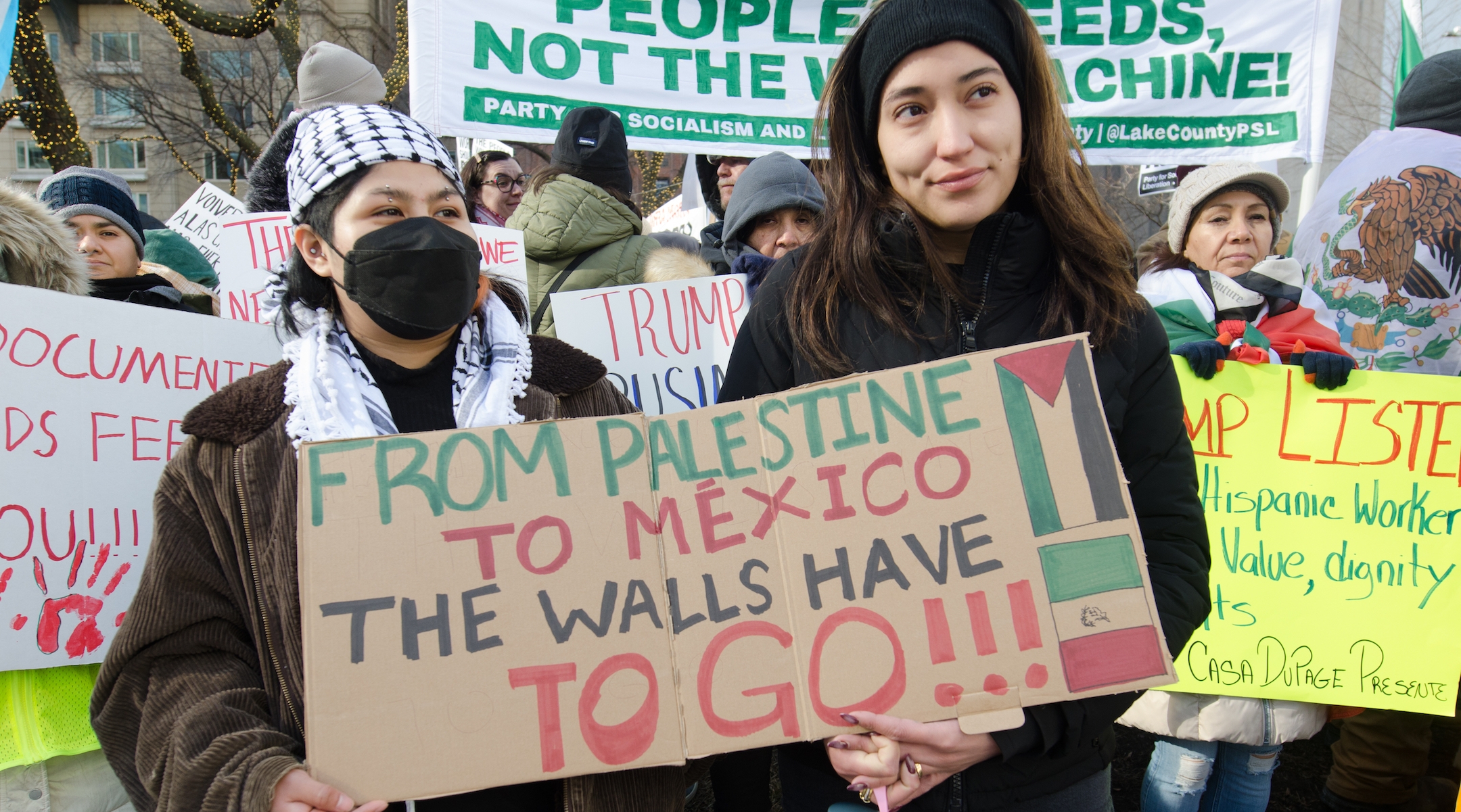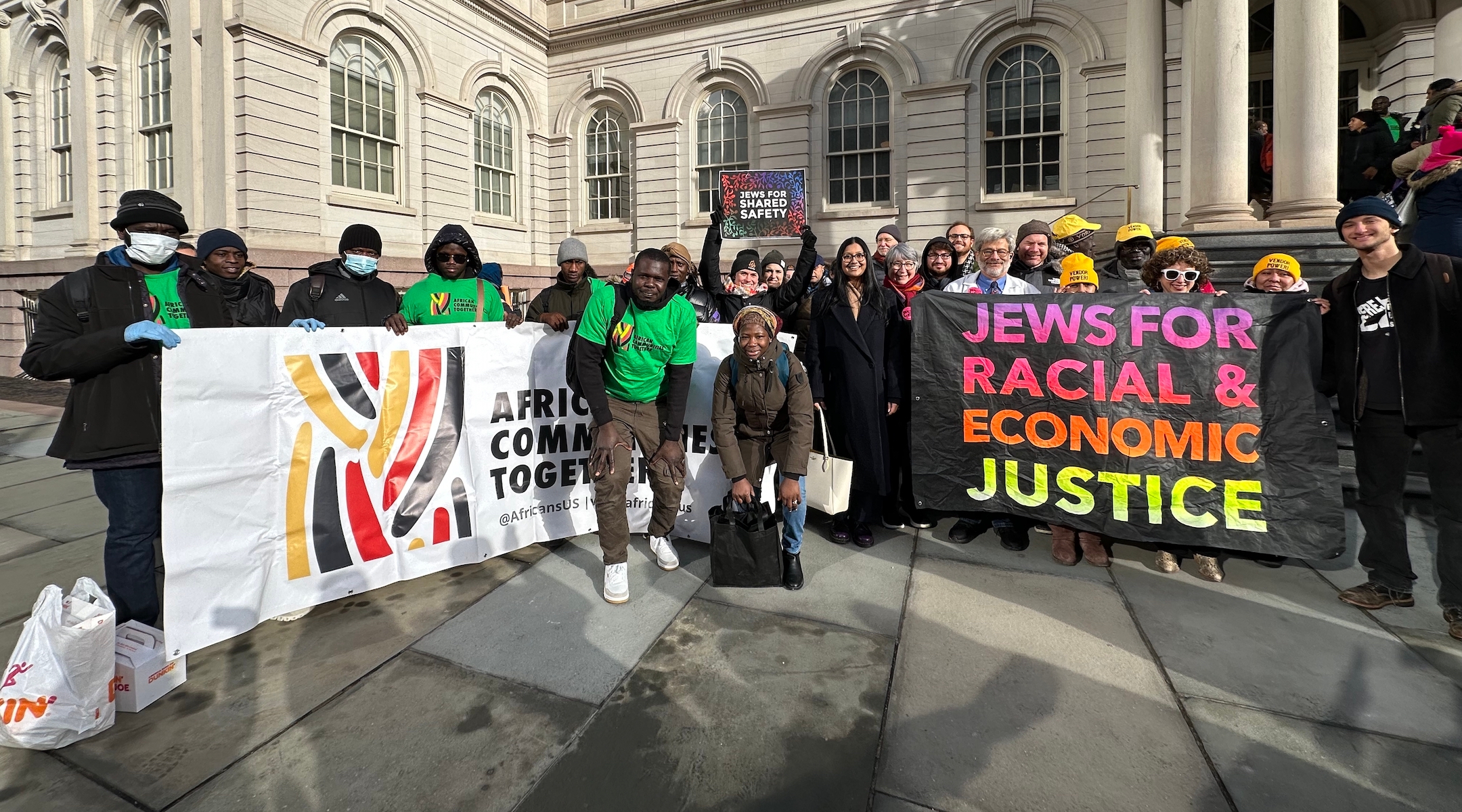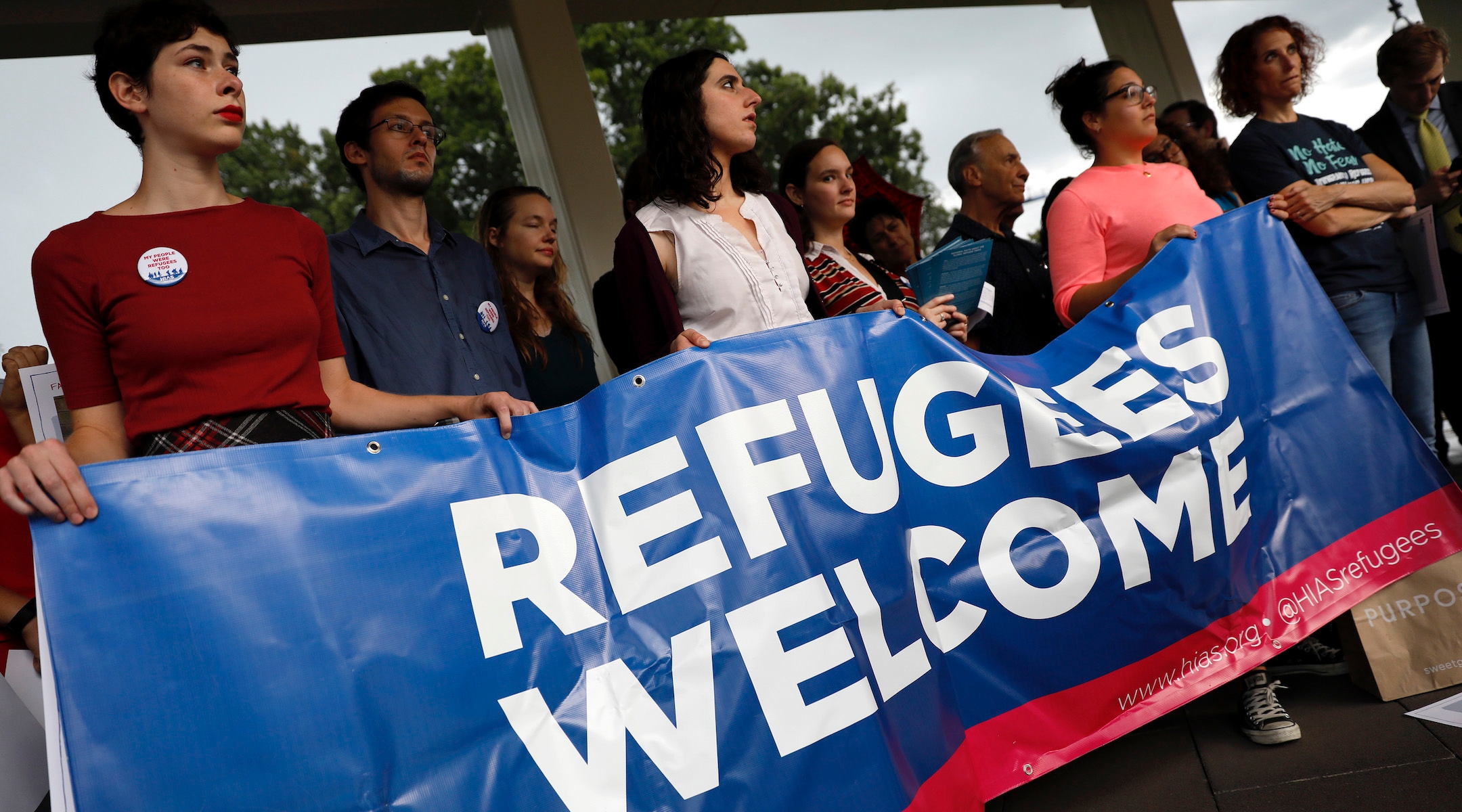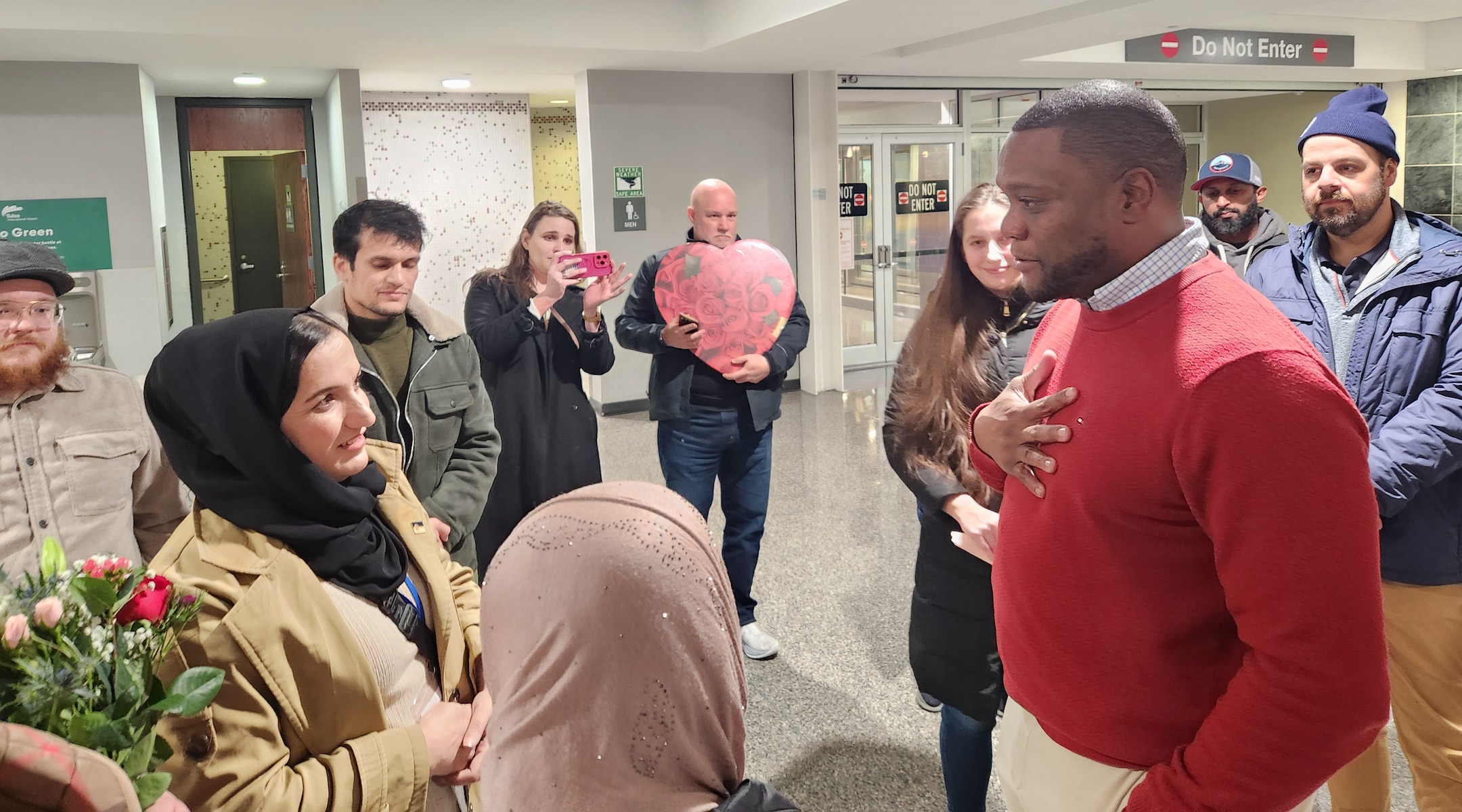The mood was bittersweet recently when Rabbi Dan Kaiman headed to the local airport to welcome an Afghan refugee about to be reunited with her sister.
On the one hand, the arrival would add to a string of happy reunions facilitated by his synagogue, Congregation B’nai Emunah in Tulsa, Oklahoma, a partner of an official resettlement organization that has helped hundreds of refugees come to the United States every year.
On the other, Kaiman knew that the experience was likely to be the last of its kind, at least for years, as the Trump administration prepared to cut off refugee admissions. Two days later, the government indeed froze all refugee resettlement grants, which the synagogue relied on to fund its work.
“It’s a gut-wrenching, impossible directive that we’re all still trying to figure out,” Kaiman told the Jewish Telegraphic Agency after the order was announced. “Way worse tha[n] I ever imagined.” Following the order, he said, they saw flight after planned flight of refugees they were supposed to help being cancelled in their system.
“It occurred to us: we had been preparing for this one arrival,” he added. “That one might actually be coming, and it actually might be our last arrival for quite some time.”
Now, Kaiman and his community are regrouping to figure out how they can help immigrants and refugees at a time when the new president is moving swiftly against them. Trump has vowed mass deportations of people who came to the country illegally, paused some aspects of legal immigration and halted support for refugees in the United States and abroad. This week he appeared to shut down the U.S. Agency for International Development, a major source of global aid, triggering chaos in developing nations around the world.
Mark Hetfield, the president of HIAS, the Jewish immigration aid and advocacy organization, said the speed and callousness with which Trump carried out the refugee cuts have shocked him — and placed new pressure on groups like his.
“We are the ones who have to deliver the news to the families here that were waiting for their loved ones, who’ve waited for sometimes decades in refugee camps, that their relatives won’t be coming,” he said.

Protesters in Chicago march on Trump Tower, demanding an end to violence in Gaza and a halt to deportation plans in Chicago, Illinois, United States on January 25, 2025. The combination of immigration-rights work with pro-Palestinian activism is creating a tense environment for Jewish groups who want to focus on immigration. (Jacek Boczarski/Anadolu via Getty Images)
As Trump’s campaign vows come to life, Jewish immigrant-rights groups from the center to the far left are dusting off their playbooks from eight years ago, when Trump first became president. But they are doing so in a changed climate, up against not only a more organized administration, but also communal reorientation spurred by the Israel-Hamas war and, some say, a general sense of liberal exhaustion. National public opinion has also turned against immigration: A Gallup poll from last June shows most Americans want fewer immigrants entering the country.
“The first few days of the administration last time, I felt like everyone was on the streets, and there was another call for protest every day,” said Beth Baltimore, an immigration lawyer who is active with the New York group Jews For Racial and Economic Justice. She hasn’t yet seen anything like that this time around: “I think maybe there suddenly is some resistance fatigue.”
Nowhere has Trump’s broad immigration crackdown been more intensely felt than in Chicago, which was in Trump’s sights even before he took office. The administration has already carried out mass deportation raids on undocumented immigrants there, overseen personally by Trump border czar Tom Homan.
The Jewish Council on Urban Affairs, a Chicago Jewish advocacy organization focused on a range of issues including immigration, “is certainly on high alert,” its director said in an interview. But, Jessica Schaffer insisted, compared to 2016, “we as an organization are in a stronger place.”
That is particularly true when it comes to immigration, she said: JCUA has been part of a monthly immigration committee that first formed in 2016, which has helped the organization maintain ties with other progressive groups that other Jewish groups have found themselves distanced from after Oct. 7, 2023.
In addition to organizing against deportation raids, JCUA is also trying to anticipate Trump’s next immigration restrictions: To that end, right now, it’s advocating for state lawmakers to guarantee a right to public education for migrant children.
JCFS Chicago, one of dozens of Jewish family service aid agencies in the country, is spending its own money to make up the federal funding gap for one of its refugee resettlement commitments: providing resources within the first 90 days of new arrivals.
CEO Stacey Shor said the group had $363,000 in federal funding to support refugees frozen since Trump took over. The group has solicited private donors to close the gap so it can keep helping the 67 refugees it welcomed to Chicago between Election Day and Inauguration Day.
“We’ve made a commitment. We’re still doing the work,” Shor said, adding that JCFS still has access to state funding for refugees and — for now — to a separate pot of federal money for the first five years of refugee residency. But she knows the group will be limited in what services it can provide going forward.
The deportation raids in Chicago, which reportedly have rounded up legal residents in addition to undocumented ones, have further complicated JCFS’s work with immigrant populations. That includes the city’s large Ukrainian immigrant community, many of whom are wartime arrivals who are in the country on a temporary humanitarian parole status.
“People are scared. People do feel targeted, and can be afraid to leave their homes,” Shor said. “We don’t ask our clients what their immigration status is. We have no reason to.”
Like Schaffer, Shor emphasized that Jewish groups in the city are better organized this time around than they were in the last Trump administration. In 2017, groups including JCFS formed the Chicago Jewish Coalition for Refugees, because, Shor said, the structure to respond to Trump’s policies simply wasn’t there. That coalition has lain dormant for years. But it’s no longer needed, she said, because its members have maintained their relationships with many of the groups they worked with last time. And she’s confident JCFS can maintain its mission in spite of everything.
“We’ll be here,” she said. “We’ve been here 160 years. We’ve made it through administrations, recessions, wars, two pandemics. We’ll be here.”

Jews For Racial and Economic Justice rallies with coalition partners at New York’s City Hall to demand New York remain a “sanctuary city” in light of President Trump’s immigration crackdown, New York, New York, Jan. 16, 2025. (Courtesy JFREJ)
On the international front, some of Trump’s new isolationist policies seem designed to simultaneously court Jewish support. One recent order placed a 90-day pause on foreign aid, but carved out an exception for sending weapons to Israel (as well as aid for Egypt, which Trump has suggested should absorb displaced Gazans).
That’s also true, in some cases, when it comes to immigration policy. Another major campaign promise of his, to deport college students who engage in advocacy the government deems supportive of terrorism, has been criticized by some Jewish groups but has also found traction and support with others including the Secure Community Network, which coordinates security for synagogues and other Jewish centers.
The moves are drawing some support from Jewish voices. The Jewish magazine Tablet, which has advanced a range of conservative views, put out an Instagram post backing the destruction of USAID.
But advocates such as Schaffer, who came to JCUA recently from HIAS, are confident that the Jewish connection to immigration rights remains strong.
“We are a community that has experienced the immigration process,” she said. “We understand the mandate to welcome the stranger is an important one.” Shor agrees, pointing not only to oft-cited Jewish values like tikkun olam, or repairing the world, and welcoming the stranger, but also to a more specific reference in Jewish law.
“We were instructed to leave the corners of our field fallow, so that anybody who needed food could come by and get it,” she said.
Schaffer added that immigration is, overwhelmingly, the biggest issue driving new Jewish supporters to JCUA: “Right now when folks are reaching out and saying, ‘OK, we want to mobilize in this moment,’ it’s because they want to mobilize around immigrant justice in particular.”
It’s also animating large Jewish groups such as the American Jewish Committee, which this week urged the Trump administration to continue supporting USAID.
And the Reform and Conservative movements signed onto an open letter last week pushing back against Trump’s immigration policies — including a directive permitting immigration officers to conduct raids in houses of worship. Some synagogues, like churches, sheltered undocumented migrants during the first Trump years, congregations in Minneapolis and Olympia, Washington, among them.
The Religious Action Center, the political advocacy arm of the Reform movement, recognized its 1985 resolution encouraging congregations to “provide sanctuary” to migrants — while also noting that the center “cannot offer legal advice” on how congregations can protect themselves from Trump’s new orders.
A few rabbis have also become outspoken immigration advocates: One, in South Carolina, was recently cut out of his state’s Holocaust memorial event broadcast after he used his speech to decry Trump’s policies on refugees and other issues.

Activists hold a banner during a pro-refugee demonstration organized by HIAS outside the U.S. Capitol, Sept. 14, 2017. (Aaron P. Bernstein/Getty Images)
But the giant in the Jewish immigration-aid space, HIAS, is entering the second Trump administration in a diminished state. Owing to what the organization said was overspending fueled by an accounting error, the group cut a large chunk of its staff, including several executive roles, over the past year. Its most recent cuts — another 22 people — came just weeks ago.
The cuts came as the group girded itself for Trump’s inauguration and what it correctly expected would immediately follow: an immediate loss of support for its refugee resettlement initiatives. The group works directly with Jewish Family Services and some synagogues, including the one in Tulsa, to resettle clients.
Meanwhile, Mark Hetfield has ceded the CEO portion of the role, which he held for a decade in addition to president, and HIAS has yet to hire another. (“I’m optimistic,” he said, when asked how the leadership search is going.)
Hetfield said he thought the Israel-Hamas war, which began when Hamas attacked Israel on Oct. 7, 2023, had made it harder to galvanize Jewish support for immigration issues — both because responding to the crisis has been demanding, and because it has accelerated political shifts within Jewish communities.
“When you look at the things that people have said within the Jewish community, of course, it’s most focused on our own and on Israel, and of course, that’s where our priority has to be,” he said. “But we can’t forget the suffering on the other side. We can’t dehumanize innocent people who live on the other side of the border.”
He tied the shift to what he observed in some Jews’ reaction to the war. “Within the Jewish community, it was very hard for many to maintain empathy for innocent lives on both sides,” he said. “And as a humanitarian, that’s absolutely what you have to do.”
Hetfield said he had a message for Jews who supported Trump or may be withholding concern about immigration issues amid interest in other portions of his agenda: “We need to make sure American Jews remember that if Trump were president when their parents or grandparents came here, they wouldn’t have come here. They wouldn’t be here, period.”
That night at the airport, Kaiman said, he felt that the experience of watching Israeli hostages being released from captivity in Gaza added another reason for American Jews to be drawn to immigration advocacy.
“We witnessed a 30-something woman hug her sister after years of separation, and we saw the joy and power of reunification. And on Sunday we saw the same thing, as three 20- and 30-something hostages experienced the very same moment,” Kaiman reflected.
“They’re not direct parallels, obviously, for a whole host of reasons,” Kaiman added. “But as a person who feels explicitly the pain of Oct. 7 and the challenges our community has faced, as a person who feels explicitly the challenges of resettlement, I can’t help but see the parallels.”
The war has also spurred changes at some left-wing Jewish groups that played an active role in organizing immigration protests during the first Trump administration. Never Again Action, for example, was an offshoot of the anti-occupation group IfNotNow when it launched in 2019; it drew a wide array of progressive Jews, including rabbis, as it staged dramatic protests outside ICE facilities.
Since the war started, the group has expanded its concerns to include “Palestinians facing genocide and apartheid” — language typically rejected even by many progressive Jews who are critical of the Israeli government and its prosecution of the war. Never Again Action did not respond to a request for comment.
Likewise, JFREJ, whose members also helped found Never Again Action, has expanded its portfolio to start treating “Israel-Palestine as a local issue.” And it is allied with the Uncommitted movement, which called on liberals not to vote for President Joe Biden’s reelection due to his support for Israel. That has induced tensions with some of the group’s historic allies, according to Baltimore, who declined to offer details.
“JFREJ stands for Palestinian liberation, which has caused, definitely, some rifts within communities,” she said.
At the same time, the alliances between Jewish and Muslim groups that solidified in the wake of Trump’s “Muslim ban” in his first administration have frayed today because of the war. Some of the Jews who flocked to airports to demonstrate alongside Muslims in 2017 today have expressed disappointment at how quickly their allies began to criticize Israel after Hamas’ attack.
But there are signs that such coalitions can be renewed. At B’nai Emunah in Tulsa, Kaiman is heavily reliant on local Muslim groups to help with resettlement work. They all help each other, he said, in a relationship that has continued unabated since Oct. 7 — and the refugees they have assisted together don’t seem to mind when a Jew helps them.
“A Syrian refugee who spent years in a Jordanian refugee camp, then moves to Tulsa, Oklahoma, and comes to a synagogue for their refugee resettlement, for their cultural orientation to what it means to be an American,” Kaiman said. “And you know how much of a problem they have with meeting me at the front door in a kippah? It’s zero.”
JTA has documented Jewish history in real-time for over a century. Keep our journalism strong by joining us in supporting independent, award-winning reporting.






